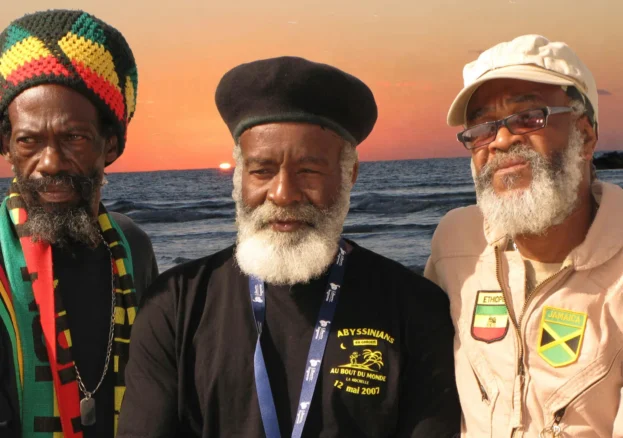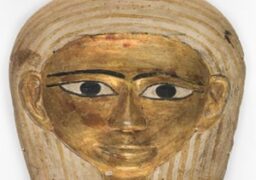
The Abyssinians is one of the music industry’s great ironies that today, weather inside or outside of reggae circles, the Abyssinians is perhaps better known for their trio unique harmony roots and spiritual music. It is Even said that Satta massagana is the anthem for reggae music after a string of hits, like Declaration of rights, Forward unto Zion, Ymassgan African race and many moor the group never quite managed to break into the mainstream, although they have seemed poised for international stardom during the early ’70s/and ’80s. The singers were all born in Kingston, Jamaica, the original member names is Donald and Linford Manning and Bernard Collins. The group was form in 1969 then they record Satta massagana at Coxson Dodd’s studio 1 then it was released on the Clinch Label .
The group separated in 1980, when each individual member go about their own separate agenda until 1989 they joined together again and recorded a album over a three year period named $19.95+Tax, it was limited amount of copies was printed and the same album was re released on the Artist Only Record Label by the name REUNION, the three original member of the Abyssinians began to do their promotional tour they work together up 1991 where the group have made their split again for the second time when Bernard Collins start to sing with two of his close friends, Donald Manning start to sing with his brother Carlton Manning and David Morrison which they have tour internationally.
In 2004, Donald Manning and Bernard Collins re-unite on stage with David Morrison they have don a European winter tour follow-up by a summer tour in the US. they have done quite a bit of work through the reunion.
Until Heartbeat Records reissued Satta Massagana (a.k.a. Forward Onto Zion) in 1993, few groups in reggae were more of an enigma than the Abyssinians. “Satta Massagana,” has been referred to as “reggae’s national anthem.” Therecording session that yielded “Satta” was arranged and financed independently and clearly marked a turning point for reggae — lyrically, rhythmically, and spiritually.
“Satta Massagana” (meaning ‘give thanks’) is obviously notable for its use of Amharic, the language of Ethiopia (Abyssinia). The Amharic is a result of Donald Manning’s Rastafarian influence on the group. The study of Amharic in Kingston in the 60s was a function of the post-colonial, Pan-African identity and Rastafarian awareness sweeping the ghetto after Haile Selassie’s 1966 visit to the island. Collins recalls how Donald’s brother Neville used to teach Amharic in the Jonestown area of Kingston. “[He] was a man who used to . . . have classes around there, where we could all go and learn the language, cause he used to get books from Ethiopia through England — Ethiopian opinions. And those books contain all literatures that we need . . . That’s how come we get acquainted with the Amharic . . . Brethren from all about used to come there and learn.”
Donald Manning explains the Amharic in some of the group’s well-known compositions. “Tena Yi Stillin. DinaIgzhabhier Y Mas Gan. Satta Massagana.’ When I say ‘Dina’ means ‘good,’ ‘Igzhabier’ means ‘God,’ ‘Y Mas Gan,’ [means] ‘he may be praised,’ so I correct the mistake that I made by singing ‘Satta Massagana’ [to God]. ‘Tena Yi Stillin’ means ‘greetings.’ It means ‘good morning.’ It means ‘good bye.’ It means ‘good afternoon.’ It means ‘health, may He give for thee.’”
The legendary “Satta” recording session included Leroy Sibbles on bass, Pill Callendar on drums, Eric Frater on guitar, Robbie Lyn on keyboards, Vin Gordon on trombone and Felix “Deadley Headley” Bennett on saxophone. “That tune really, no one specially [gave] a specific arrangement to that song,” recalls Bernard Collins. “We went there singing the song on our guitars. Cause we had like the melody progression. So we went there playing the chords and everything on the guitar, and while we play, everybody just came in. Cause these men were professional musicians . . . You haffe say they did all the arrangement really, Leroy Sibbles feel out his own bass line, Deadley Headley . . . cause we didn’t go in there with no special arrangement — just the basic chords and the progression of the song and the melody. Is just a vibes tune.
The original “Satta” recording was ‘versioned’ (remixed and/or re-voiced) more than a dozen times, including the Abyssinians’ own remake “Mabrak,” a direct response to Joe Gibbs’ “A So.” Instrumentals included “Thunderstorm” featuring Bongo Herman, and several Tommy McCook/Vivien Hall horn overdubs including “Mandela.” Collins later re-voiced the song as “Satta Me No Born Yah.” Prince Far I, Big Youth, Dillinger and others also took shots at the rhythm. Since its debut in 1969, nearly every producer in reggae has remade “Satta,” and literally hundreds of remakes of the song exist.
Collins says that “Satta” is at the root of modern dancehall and dub. “[‘Satta’] was like the first dancehall song. And the first dub, ‘Satta Massagana.’ . . . if you listen to the flip side of ‘Mabrak,’ same ‘Satta’ version . . . is drum and bass. Because we record that tune on two-track [two-channel tape recorder]. When I was at the studio one day, cutting a pure stamper, one of my bredren just put it on single track [one channel], and we just get the drum and bass. And him say, ‘but wait, this sound good man!’ And we just release the flipside of ‘Mabrak,’ which is ‘Issat’ — pure drum and bass. And that used to play in the dancehall, regular. Cause we used to sell a lot of dub plates, like a special to sound systems — Sir George, Tubby’s, and all them ready sound (sound systems).Cause we get the dub wax of it right in the dancehall, and from there on you find the dub and version start springing up. From 1970 come down . . . Version business!” The Abyssinians were featured performing “Satta” in acapella style in the film Roots, Rock, Reggae in 1976 and again in Rockers in 1978. These are the only known film appearances of the original trio.
Carlton Manning’s key role in mentoring the Abyssinians is comparable to the role Joe Higgs played with the Wailers years earlier. Not only did Carlton Manning coach the trio in the minor chord harmony singing that would define its style, but he taught Donald to play the guitar.
From the early to mid-70s, the Abyssinians recorded sparingly, but the quality of the group’s work was remarkable. Bernard Collins returned to Studio One in 1970 (without the Manning brothers) to record “Declaration of Rights” with George Henry and Leroy Sibbles singing backing vocals. The recording featured an essential arrangement and organ melody by Jackie Mittoo and rhythm by Leroy Sibbles on bass and Leroy “Horse mouth” Wallace on drums. Notably, the song was one of Bob Marley’s favourites, and a lyrical influence can be heard on The Wailers’ well-known “Get Up, Stand Up” recorded in 1973.
The next Abyssinians recording sessions yielded “Let My Days Be Long” and “Poor Jason Whyte,” both released as 45s on the group’s Clinch label. Another of the group’s most enduring tracks was “Y Mas Gan,” recorded for Lloyd “Matador” Daley in 1972. Other singles, including “Reason Time,” “Leggo Beast,” and “Love Comes and Goes” followed by the mid-70s.
The Abyssinians’ first full album was recorded in 1976 and is regarded as one of the greatest in the history of Jamaican music. The sessions were supervised by Clive Hunt and resulted in the album known both as Forward Onto Zion and Satta Massagana. Every track exudes the spiritual essence of the Abyssinians. Regrettably, the tapes were pirated, and the album didn’t see legitimate release until Heartbeat (US) and Blue Moon (France) released it in the mid-90s.
The group’s deeply spiritual, africentric lyrics were crystallized on virtually every cut on the album, and it featured remakes of “Satta,” “Declaration of Rights,” and “Y Mas Gan.” Donald Manning’s masterpiece “African Race” is one of defining compositions of the album and of the group’s career. After a seductively beautiful acoustic guitar solo by Mikey Chung, the song erupts into a chilling roots anthem. The lyrics speak with pride of African heritage and survival of slavery.
Despite the illegitimate release of the Clive Hunt sessions, the success of the “Tenayistillin” single in England gained the Abyssinians enough credibility with Virgin that the group became one of the crop signed to the UK giant in 1978. The fruit of the Virgin deal was the Arise album, a good effort but certainly not the cornerstone that the group needed for international commercial success. The underexposure of the Clive Hunt sessions was one of the major tragedies of the Abyssinians’ career.
The group gained some exposure through its performance at Sunsplash II in 1979, although the performance was not included on the documentary film of the event.
Forward, released in 1982 by Alligator in the US, collected some early tracks like “Jerusalem” (b-side to the original “Satta” 45), “Mabrak,” “Peculiar Number,” several superb Bernard Collins solo cuts, plus “Forward Onto Zion” and the remake of “Satta,” both from the Clive Hunt sessions.
The Abyssinians were inactive during the mid-80s, because Linford Manning left Jamaica in 1980, and Donald left in 1984. Bernard Collins went to New York in 1986 to work on an album at Phillip Smart’s HC&F studio on Long Island. Many of those tracks would be used for the Last Days album. The Abyssinians would play Sunsplash in Jamaica in 1989 and in Europe in 1990, and then Linford Manning left the group for good. The group performed again on Sunsplash 92 in Montego Bay.

